
AI tools can simplify and optimize workflow management, saving time and cutting costs. This article reviews six leading platforms tailored for businesses of all sizes. Here's what they offer:
Quick Comparison:
| Platform | Key Strengths | Scalability | Best For | Cost Model |
|---|---|---|---|---|
| Prompts.ai | Access to 35+ AI models, cost control | Enterprise-ready | Large enterprises, AI governance | Pay-as-you-go TOKN credits |
| Domo | Data integration, real-time analytics | Large-scale | Data-driven organizations | Subscription-based |
| Power Automate | Microsoft ecosystem integration | Dynamic cloud scale | Office 365 users, low-code needs | Per-user or per-flow licensing |
| Wrike | Project-focused automation | Team to enterprise | Task and project management | Tiered subscription plans |
| Asana AI Studio | AI-enhanced project management | Team-friendly | Collaboration and productivity | Freemium with premium tiers |
| n8n | Open-source, customizable workflows | Self-hosted/cloud | Technical teams | Free or paid hosting plans |
Each platform caters to different needs - whether it's AI orchestration, data analytics, or project management. Choose based on your team's goals, technical expertise, and budget.
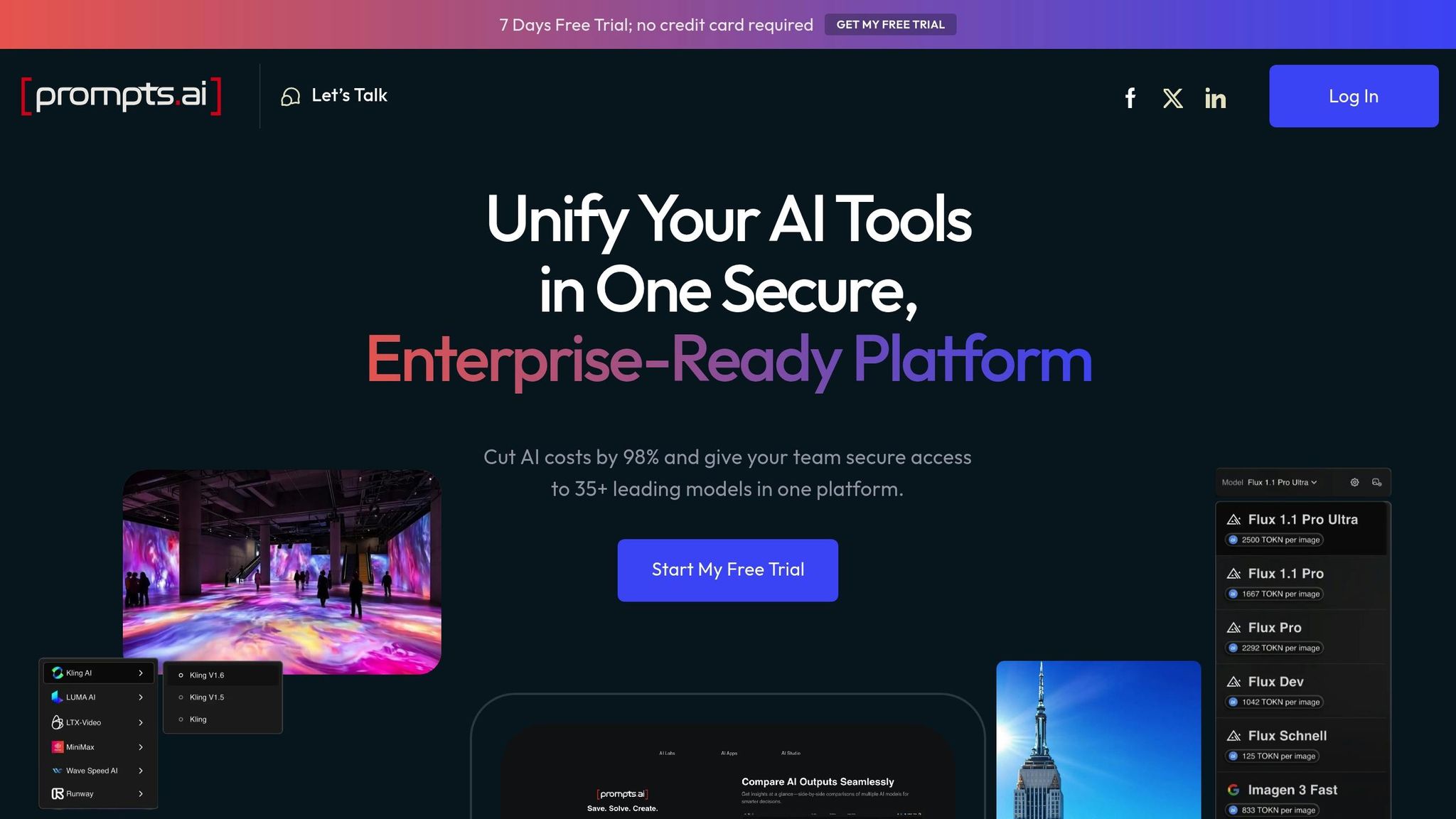
Prompts.ai is an enterprise-grade AI orchestration platform that consolidates over 35 cutting-edge large language models into a single, secure interface. By centralizing access to models like GPT-4, Claude, LLaMA, and Gemini, the platform eliminates the chaos of managing multiple AI tools, offering a streamlined solution for businesses grappling with AI tool sprawl.
At its core, Prompts.ai focuses on unifying model selection, prompt workflows, and real-time cost controls into one cohesive system. This setup transforms scattered AI experiments into structured, compliant processes, allowing teams to shift their focus to innovation and measurable outcomes rather than struggling with disconnected platforms.
Prompts.ai offers seamless integration with existing business tools and systems, ensuring it fits smoothly into current infrastructures while adhering to strict security and compliance standards.
The platform’s integration framework simplifies incorporating AI into established workflows without disrupting daily operations. Teams can access multiple AI models through a single, intuitive interface, cutting down the complexity of managing various platforms across departments. This approach minimizes silos and ensures that businesses can harness AI’s potential without requiring deep technical expertise from their teams.
Prompts.ai is designed to scale effortlessly, supporting organizations of all sizes - from small creative agencies to Fortune 500 companies. The market for prompt engineering is on track to hit $2.06 billion by 2030 with a 32.8% CAGR, reflecting the rising demand for scalable AI solutions.
The platform adapts to both simple tasks and complex, multi-department operations. Its pay-as-you-go TOKN credit system aligns costs with actual usage, offering flexibility for businesses to expand their AI initiatives without being tied to fixed fees. This makes it easier for organizations to grow their AI capabilities as their needs evolve.
Prompts.ai’s automation tools bring dynamic workflow orchestration to the table. Unlike traditional systems with rigid programming, this platform uses AI to adjust workflows in real-time based on performance metrics and data.
Highlights include side-by-side comparisons of different AI models, enabling teams to continuously refine their workflows for maximum efficiency. Additionally, the platform features pre-built "Time Savers" – expertly crafted prompt workflows that can be deployed instantly, cutting down the time needed to implement effective AI strategies.
Prompts.ai tackles the issue of hidden costs and unpredictable spending head-on with its built-in FinOps layer, which provides real-time tracking of every token used.
By consolidating AI tools into one platform, organizations can achieve cost reductions of up to 98% compared to managing separate subscriptions. The transparent pricing model eliminates unexpected charges, linking AI spending directly to tangible results. Real-time analytics allow teams to optimize model selection based on both performance and cost, ensuring AI adoption remains both effective and financially sustainable.
Detailed usage reports further enhance cost management, showing which models and workflows deliver the best return on investment. This empowers organizations to make informed decisions about their AI strategies and budget allocations, maximizing the value of their AI initiatives.
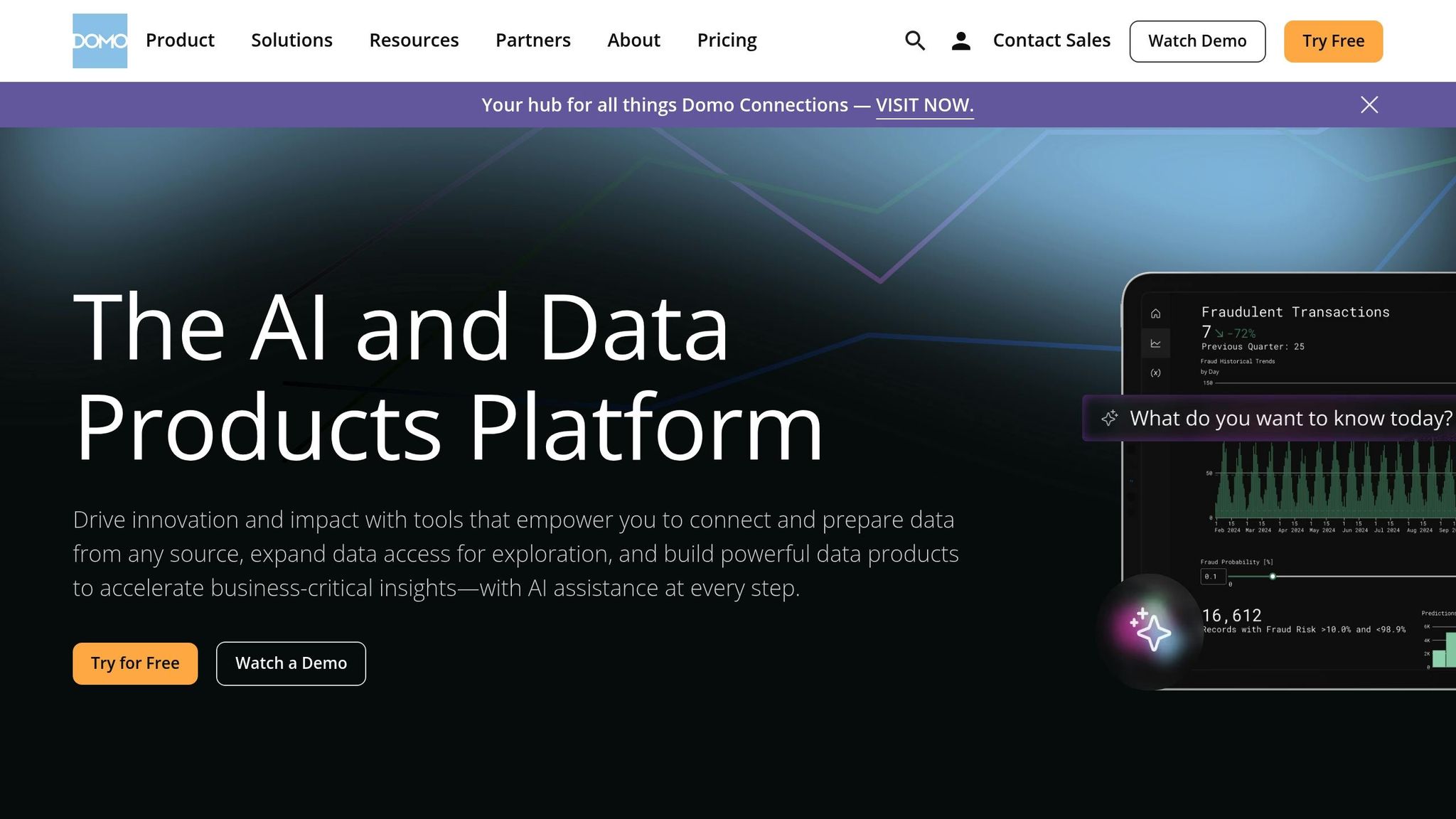
Domo is a cloud-based BI platform designed to bring together data from various sources, offering real-time analytics to help businesses connect, visualize, and act on their data.
By eliminating data silos, Domo brings clarity to fragmented systems, enabling better insights and decision-making.
Domo excels in data integration, offering over 1,000 pre-built connectors for both cloud applications and on-premises systems. The Domo Workflows feature facilitates seamless communication between third-party data sources and APIs. For businesses with proprietary systems, Domo provides flexible options, including APIs, SDKs, custom connectors, and webhooks.
The platform also supports data federation, allowing users to query and visualize data directly from cloud warehouses without creating duplicates. Its Data Writeback functionality enables bi-directional data flows, letting teams send processed data back to source systems using ODBC, writeback connectors, or APIs. A notable update in August 2025 introduced File and FileSet Entity Data Types, making it easier to retrieve and use data from individual files or FileSet directories within workflows.
These integration tools make it easier for businesses to scale and adapt as their data needs grow.
Domo’s cloud-native architecture is built to scale, whether for small businesses or large enterprises. The platform supports real-time data warehousing, providing live data streams for operations like order tracking, supply chain monitoring, and sales dashboards. This allows businesses to respond instantly to changing conditions.
"We have 300 stores, and every day I hear from our store managers and sales reps saying, 'What did I do without Domo?'" - Josh Stan, Director of Corporate Development & Reporting
Domo’s ability to auto-aggregate data on-the-fly ensures users can query transactional data without performance slowdowns. Additionally, its scalable, role-based permissions system allows organizations to manage hundreds of users within a single platform instance. This flexibility ensures that businesses can maintain efficiency as their operations grow.
Domo enables intelligent workflow automation by integrating features like Approvals, Alerts, Cloud Functions, and Dataflows. It also supports custom API calls and webhooks, offering extended functionality. The code engine function within Workflows allows external systems to trigger automated responses, streamlining processes further.
Designed with mobile users in mind, Domo provides decision-makers with real-time insights accessible anytime, anywhere.
"I was hooked the first time I opened the app on my phone. Real-time, anywhere in the world, in my back pocket, I had access." - Jeremy Andrus, CEO
Domo promotes efficient cost management through its scalable data product design, which allows teams to create reusable data products that adapt to organizational changes. This approach minimizes issues like versioning conflicts and duplicated logic that can occur when scaling too quickly. Its elastic infrastructure ensures organizations only use the computing resources they need, reducing unnecessary expenses.

Microsoft Power Automate is a cloud-based solution designed to help users automate workflows across applications and services. As part of the Microsoft Power Platform, it simplifies repetitive tasks and bridges disconnected systems - all without requiring coding expertise. From basic data transfers to intricate workflows, Power Automate empowers users to streamline operations efficiently.
Power Automate connects seamlessly with a wide range of applications through its pre-built connectors, including popular tools like SharePoint, Teams, Outlook, Salesforce, and ServiceNow. These connectors enable effortless data flow between Microsoft 365 tools and third-party platforms. For more complex integrations, the platform supports on-premises data gateways and custom connectors, making it possible to integrate legacy systems and proprietary software with modern cloud services. Additionally, desktop flows allow users to automate tasks in older desktop applications, ensuring comprehensive coverage for diverse business needs.
The platform is designed to scale effortlessly, whether for individual users or large enterprises, through its tiered licensing options. Its cloud infrastructure adjusts dynamically to meet changing workflow demands, ensuring consistent performance even as workloads grow. Administrators can manage separate environments for development, testing, and production workflows, minimizing disruptions during scaling efforts. With the integration of AI Builder, businesses can enhance their workflows with machine learning capabilities like automated document processing, sentiment analysis, and predictive modeling - ideal for managing increasing data volumes as organizations expand.
Power Automate offers a variety of automation tools to address different business needs. Approval workflows streamline request handling with built-in escalation rules, tracking response times and bottlenecks automatically. Scheduled and trigger-based flows provide flexibility, allowing workflows to run at specific times, react to data changes, or activate under specific conditions. For workflows requiring simultaneous task handling, the platform supports parallel processing. Additionally, the Process Advisor tool analyzes existing workflows to pinpoint inefficiencies and suggest areas ripe for automation.
Power Automate employs a straightforward pricing structure based on per-user and per-flow models, making it easier for organizations to plan budgets. Licensing options include bundles with Microsoft 365 subscriptions as well as standalone licenses for more specific automation needs. Detailed usage analytics provide insights into flow performance, execution frequency, and resource consumption, helping businesses evaluate their return on investment and find ways to optimize costs. Licensed flows can be shared among multiple users, reducing per-user expenses, while premium connector usage is tracked to help manage costs associated with third-party integrations effectively.
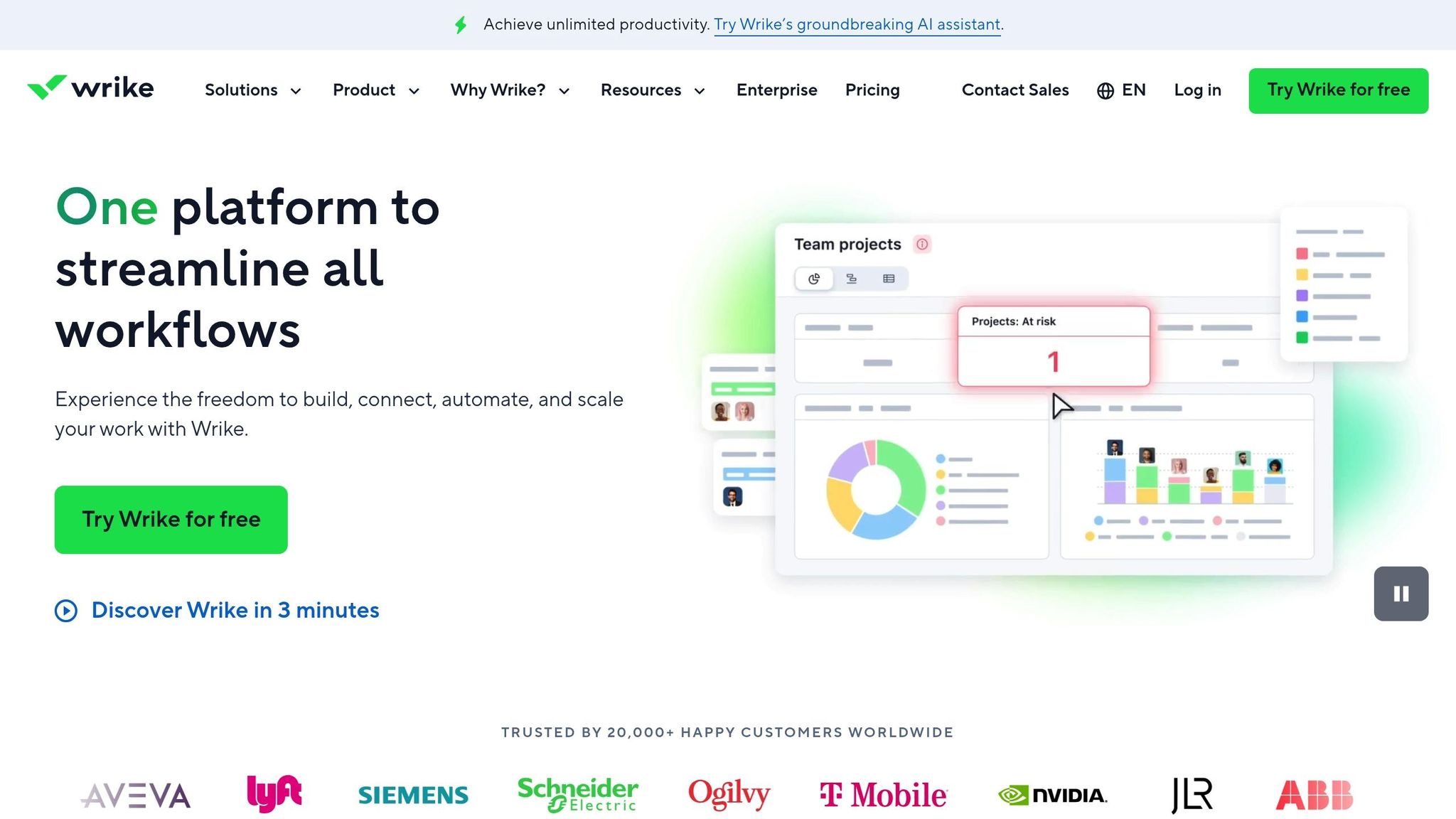
Wrike simplifies project management by combining workflow automation with tools that improve visibility and reduce repetitive tasks. Its ability to integrate with various platforms further optimizes efficiency.
Wrike connects effortlessly with widely-used business applications, ensuring smooth data synchronization. For instance, its email integration turns emails into actionable tasks, while built-in time tracking and review tools help streamline project oversight. Additionally, its adaptable API enables organizations to link Wrike with proprietary systems and databases for tailored solutions.
Wrike is designed to grow alongside your team, whether you're a small group or a large enterprise. Its customizable workflows and resource management tools adjust to the increasing complexity of projects. Cross-functional templates ensure consistency across departments, making collaboration more seamless. These features align with modern, AI-driven approaches to improving workflow efficiency.
Wrike reduces manual work by automating key tasks. Features like pre-built templates, intelligent task assignments, and conditional logic automate processes and ensure critical actions are triggered. Automated status updates also keep projects on track by prioritizing the most important tasks.
Wrike operates on a subscription-based model, with pricing details available upon request. The platform also offers usage analytics, allowing organizations to track activity and manage budgets with greater precision.
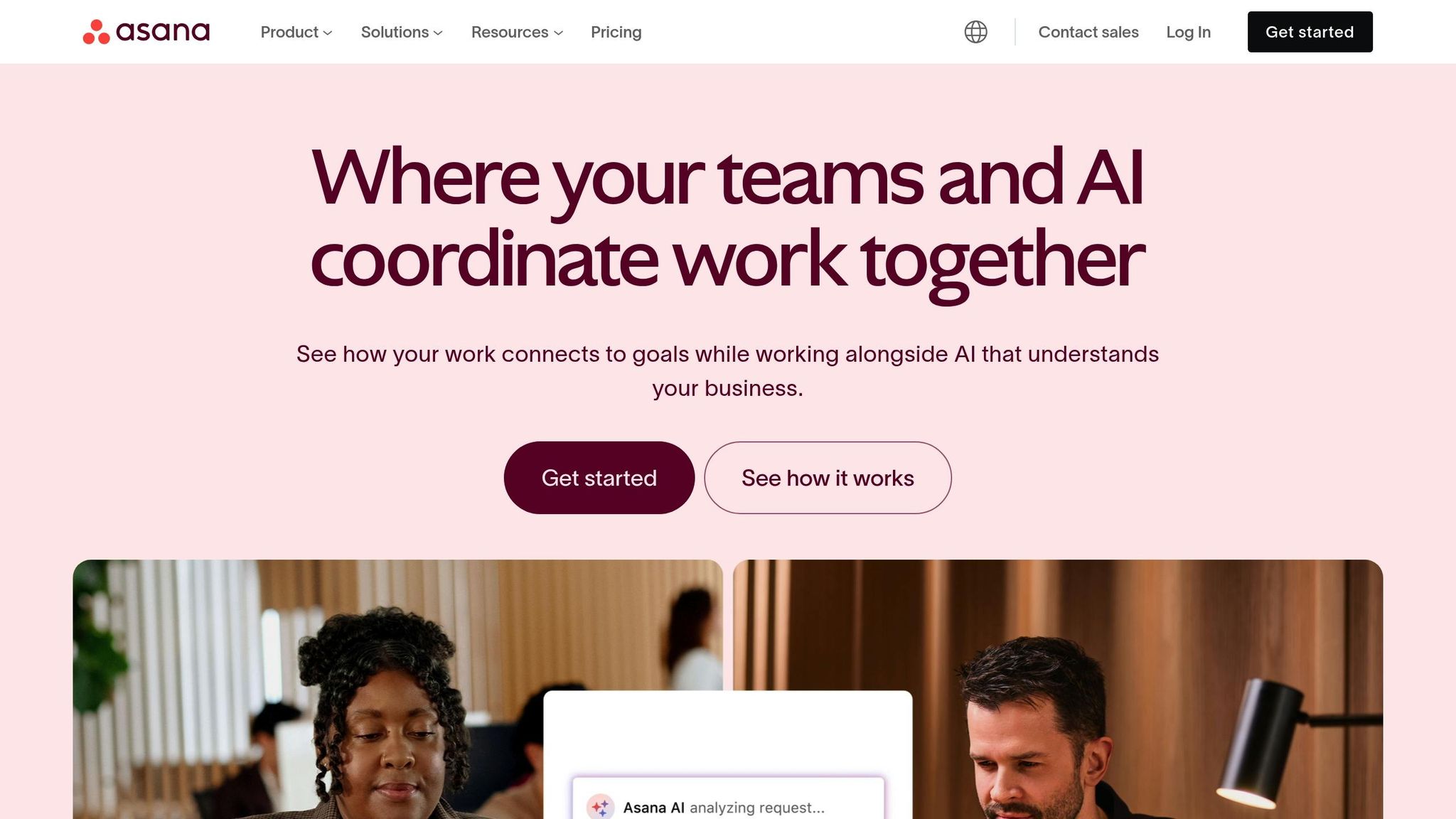
Asana AI Studio brings artificial intelligence into project management, transforming the way teams track tasks and stay organized. This feature enhances productivity by automating task prioritization, suggesting resource allocation, and offering predictive insights to help teams navigate potential challenges with ease.
Asana AI Studio works effortlessly with widely used business tools like Slack, Microsoft Teams, and Google Workspace. It streamlines collaboration by turning conversations and emails into actionable tasks automatically. Additionally, its smart project templates evolve based on team workflows and past project data, ensuring a more personalized and efficient experience.
Designed to grow alongside your organization, Asana AI Studio adapts to teams of all sizes. Its AI algorithms learn from team interactions and project results, refining workflows as the organization expands. Over time, the platform delivers increasingly precise recommendations and predictions tailored to unique team dynamics and project needs.
The platform takes the hassle out of routine tasks with intelligent automation. Features include automated status updates, workload balancing to prevent team burnout, and smart deadline adjustments that respond to changing project conditions. It also delivers progress reports and alerts for potential risks, enabling managers to make informed, proactive decisions.
Asana AI Studio is included in Asana's premium subscription plans, offering advanced analytics to showcase the efficiency gains from its AI features. Organizations can track metrics like time saved on manual tasks and faster project completion rates, making it easier to evaluate the platform's return on investment.
With these capabilities, Asana AI Studio demonstrates how AI can simplify workflow management, paving the way for comparisons with other top platforms in the industry.
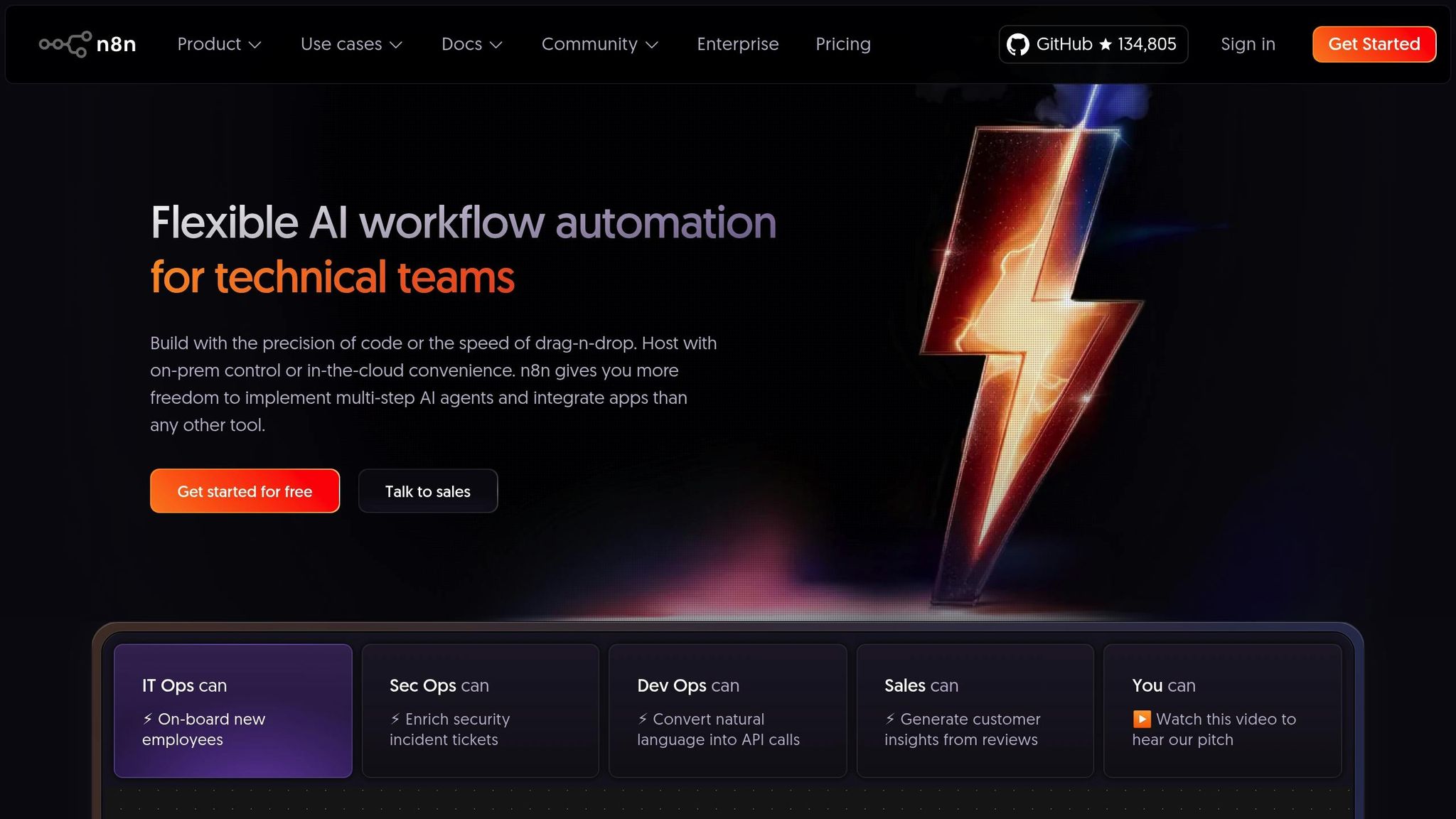
n8n serves as a powerful tool for workflow automation, giving technical teams complete control over integrations. This open-source platform excels in building intricate, multi-step workflows that connect various systems, all without requiring extensive coding expertise. Instead of traditional methods, n8n employs a visual node-based interface where each connection represents a specific action or data transformation.
The platform is well-equipped to handle complex business logic, supporting features like conditional branching, data manipulation, and robust error management. This flexibility allows teams to design workflows that adapt dynamically to different scenarios, making n8n a strong choice for businesses with demanding operational needs.
One of n8n's standout features is its open-source design, which allows for highly customizable integrations. From Salesforce to Discord, the platform supports a wide range of connections. With HTTP request nodes and webhook functionality, technical teams can create custom integrations to link virtually any API-driven system. Additionally, n8n simplifies data transformation, enabling seamless reformatting and routing of information to multiple destinations.
n8n is designed to grow alongside your business. Whether self-hosted or deployed in the cloud, the platform offers full control over infrastructure and data. It can handle high-volume workflows and scales horizontally by adding server instances as needed, accommodating increasing workflow complexity with ease.
The platform goes beyond basic trigger-action automations by offering advanced features like loops, conditional logic, and data aggregation - all within a single workflow. This versatility empowers teams to analyze incoming data, make decisions based on set criteria, and execute multiple actions accordingly. With built-in error handling, including retries and alternate execution paths, n8n ensures workflows remain operational even when individual steps encounter issues.
n8n operates on a freemium model, making it an affordable choice for tech-savvy teams. The core platform is open-source and free for self-hosting. For those who prefer cloud-hosted solutions, n8n provides a free tier and competitively priced plans that include enterprise-level features like enhanced security and priority support.
n8n stands out as an open-source alternative for teams seeking full control over their infrastructure and custom integrations. Its freemium model appeals to technically skilled teams looking for a cost-effective, flexible solution without the constraints of proprietary platforms.
This comparison brings together the strengths and challenges of each platform, offering a clear picture to help organizations select the best fit for their operations, technical needs, and budgets.
Prompts.ai shines with its unified interface, integrating access to over 35 top-tier AI language models. Its pay-as-you-go TOKN credit system eliminates recurring fees, making it appealing for enterprises, especially Fortune 500 companies, that prioritize security and governance. However, for organizations focused on more conventional workflow automation, its specialized AI orchestration features might feel like overkill.
Domo excels in its data-centric approach, seamlessly combining business intelligence with workflow management. Its extensive library of connectors makes it ideal for businesses with heavy analytics requirements. That said, smaller teams may find its robust feature set overwhelming and its pricing less appealing.
Microsoft Power Automate offers seamless integration within the Microsoft ecosystem, making it a natural choice for organizations already using Office 365 and Azure. With a wide array of pre-built connectors and strong security features, it simplifies automation tasks. However, teams relying on diverse tools might face integration hurdles, and costs can escalate as complexity grows.
Wrike provides a strong foundation for project management, enhanced by workflow automation capabilities. Its collaborative tools and customizable dashboards are great for managing intricate projects, though new users may encounter a steep learning curve. Additionally, some advanced automation features are only accessible through higher-tier plans.
Asana AI Studio combines its familiar project management interface with emerging AI features. Its user-friendly design makes it an attractive option for teams without deep technical expertise. However, as its AI capabilities are still evolving, organizations with highly complex workflows may need to rely on additional integrations.
n8n stands out with its open-source architecture, offering technical teams the flexibility to fully customize their automation setups. Its visual, node-based workflow builder simplifies complex processes, but it requires technical know-how and lacks the enterprise-level support some organizations might need.
For a quick comparison, the table below outlines the key features of each platform:
| Platform | Integration Capabilities | Scalability | Automation Features | Cost Transparency |
|---|---|---|---|---|
| Prompts.ai | Access to over 35 leading AI models with enterprise APIs | Enterprise-scale performance | AI-driven workflows with strong governance | Pay-as-you-go TOKN credit system |
| Domo | Extensive library for data integration | Large-scale deployments | Combines business intelligence and workflow automation | Subscription-based with customizable plans |
| Microsoft Power Automate | Pre-built connectors within the Microsoft ecosystem | Cloud scalability via Azure | Low-code automation with built-in AI features | Per-user licensing with usage-based options |
| Wrike | Integrations focused on project management | Scalable for teams and enterprises | Project automation and resource coordination | Tiered subscription plans |
| Asana AI Studio | Integrations designed for team collaboration | Optimized for team environments | Task automation paired with emerging AI features | Freemium model with premium tiers |
| n8n | Flexible options via open-source architecture | Self-hosted or cloud solutions | Visual workflow builder for complex processes | Free open-source with optional hosting fees |
Choosing the right platform ultimately depends on your organization’s goals. Teams prioritizing advanced AI integration may gravitate toward Prompts.ai for its unified model access and enterprise-grade governance. Meanwhile, others might value data analytics, seamless ecosystem integration, or the flexibility of open-source platforms. Matching platform strengths with your specific needs will ensure effective and efficient automation.
Selecting the right AI solution for your workflows depends on your specific goals, level of expertise, and automation needs. Prompts.ai stands out by offering seamless access to over 35 top-tier AI models, robust enterprise-level governance, and a straightforward pay-as-you-go system with TOKN credits - helping reduce costs by as much as 98%. By addressing tool sprawl and maintaining rigorous security standards, Prompts.ai emerges as a powerful choice for managing workflows efficiently and securely.
Prompts.ai provides businesses with real-time cost tracking and precise expense management tools, making it easier to oversee and control AI-related spending. Through intuitive dashboards, users can break down expenses by model, team, or project, ensuring every dollar is accounted for with complete clarity.
By offering continuous monitoring, organizations can keep their budgets in check, fine-tune AI expenditures, and steer clear of surprise costs. These features empower teams with the visibility and control they need to make smarter financial decisions and get the most out of their AI investments.
Prompts.ai connects effortlessly with your current business systems, providing a single, streamlined interface to manage various AI tools. It works seamlessly with platforms like Microsoft Power Platform, making workflow automation more accessible and boosting overall efficiency.
The platform offers flexible options, including customizable routing rules and model selection, catering to a wide range of enterprise requirements. These features help businesses simplify operations, cut expenses, and integrate AI-driven solutions smoothly into their daily processes.
Prompts.ai's automation tools are designed to make workflows smoother by seamlessly connecting various AI models, tackling complex tasks automatically, and delivering real-time operational insights. These features allow teams to work together effortlessly, cut down on manual efforts, and focus on what truly matters.
By simplifying processes and speeding up decision-making, Prompts.ai helps organizations embrace fresh ideas and stay flexible. Teams can enhance productivity, manage costs more effectively, and tackle workflow hurdles with ease, creating an environment where efficiency and creativity thrive.


